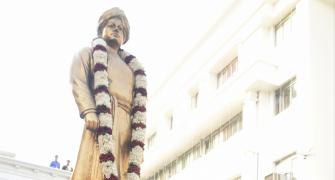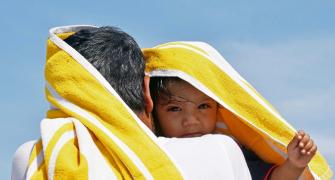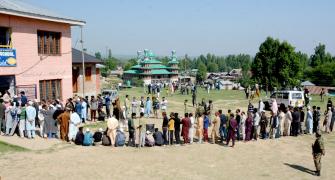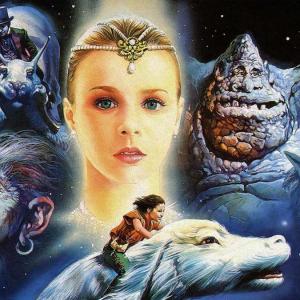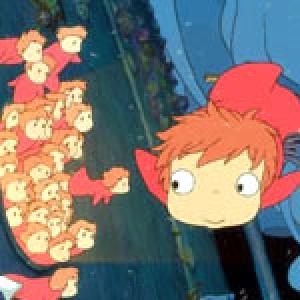The Boy And The Heron offers a thrilling joyride inside Hayao Miyazaki's unquantifiable imagination, applauds Sukanya Verma.

Hayao Miyazaki's cinema speaks to the budding adult in a child as well as the lingering child in an adult.
Growing up, our experiences shape us and help us move forward and beyond but Miyazaki's ability to stay in touch with the starting point of those realisations in their nascent, innocent stage lends his creations an emotional purity that resonates with who we used to be or wish to become.
Fitting that his book of memoirs be called Starting Point, where he acknowledges, 'fantasy worlds of cartoon movies strongly represent our hopes and yearnings. They illustrate a world of lost possibilities for us.'
The Boy And The Heron, his return from retirement a decade after The Wind Rises, captures the human condition in the coming-of-age of 12-year-old Mahito's locked-up grief prompted by the tragic loss of his mother in a hospital fire.
Amidst the chaos of World War II, Miyazaki's memories of 'bombed out' cities wherein he was forced to flee Tokyo comes into play in the horrific fire and explosions imagery of its opening scene when a helpless Mahito rushes to save and see his mom for the last time.
Semi-autobiographical in nature for resembling the rude feeling of displacement thrust upon a young Miyazaki, his father's work in the aeroplane parts industry as well the melancholy he harboured over his ailing mum, The Boy And The Heron brims of his signature artistry.
Driven by loss or curiosity, young girls and boys in his stories embark on enchanting, enigmatic adventures leading them into quaint worlds, anthropomorphic delights and enlightenment that's uniquely profound for a children's movie.
One senses a familiarity of these ideas, idiosyncrasies and images, imprinted in our memories over the course of several Studio Ghibli gems helmed by the Japanese master -- My Neighbour Totoro, Castle in the Sky, Kiki's Delivery Service, Princess Mononoke, Spirited Away, Howl's Moving Castle and Ponyo -- in the fantastical inventions of The Boy And The Heron as well.
What sets the 83-year-old film-maker's second Academy award winner for Best Animation apart, is Mahito's journey ends in the acceptance of his sorrow, not a relief from it.
Miyazaki's hand-drawn animated masterpieces depict a legacy of his breathtakingly expressed politics and devotion to balance, which can be traced to the ethos and instructions articulated in one of his most cherished books.
A gift from Mahito's mother for her 'grown up son' and the uncle-son bonds that prompt much of its wisdom, Genzaburo Yoshino's 1937 novel, How Do You Live? forms the loose inspiration behind The Boy And The Heron.
Tucked away from the devastation of the ongoing Pacific war, Mahito comes to live in the serene countryside estate at his late mother's sister, now also his father's new wife.
Despite the comforting sight of lush nature, cheerful grannies and cordial stepmom, Mahito's pent-up sorrow neither dies down nor reveals the extent of his pain save for the pitter patter of tears dashing against the pages of the aforementioned book or a disturbing scene of self-inflicted injury as an act of exasperation.
But when a magical, mocking heron knocks at his window and claims his mother is still alive, Mahito's rage and rush to get to the bottom of it takes him down a mysterious, abandoned tower of the premise.
It's not all whimsy and Wonderland alone as Miyazaki unleashes a mix of violent spectacle and faunal oddities that charm and stupefy in turns.
Talking animals speak greater truths than humans in his world even as feminist figures storm to the rescue and curious sidekicks turn out to be more than a sum of their parts, The Boy And The Heron offers a thrilling joyride inside Miyazaki's unquantifiable imagination.
Every now and then of its two hours long exploration of death, grief, dreams and reality, determined not to distinguish real from surreal, the parallel universe of metaphors and metaphysics manifested by Mahito's anguish stops to take a mediative pause. Not so much to make sense of the confusion as to make his peace with it.
The action is not always coherent but its dazzling details are fascinating to consume.
Mahito's mother and step-mother are frantically tossed into the mix. But it's the paper attack and parade it brings about, you hold on to.
High-minded ideals hurriedly highlight the coming-of-age at work in Mahito's encounter with his wizard-like granduncle. But it's the embodiment of moral balance across jenga blocks, you are drawn to.
In the documentary 10 Years with Hayao Miyazaki, the living legend insists 'easy-to-understand movies are boring. Logical storylines sacrifice creativity'.
Suffice to say, there's nothing remotely boring about The Boy And The Heron's picturesque journey and elegiac insights.
P:S: The Boy And The Heron is playing in theatres in both Japanese (with subtitles) and English versions.
P:P:S Some of the scenes may be a tad graphic and disturbing for children below 10 years.



